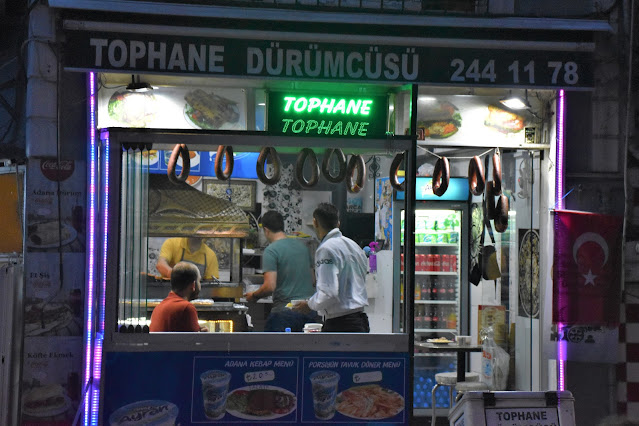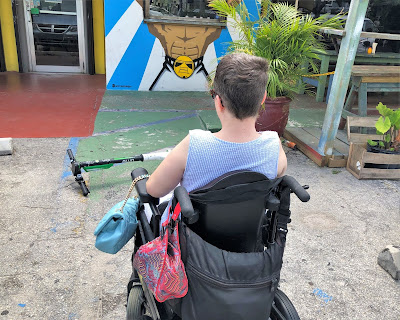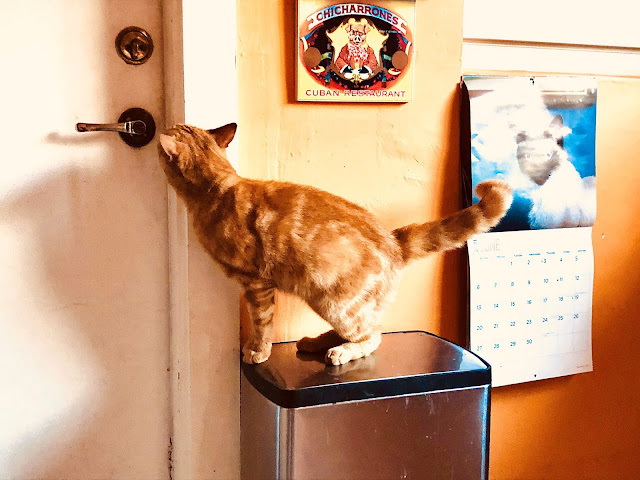CITY OF MIAMI ROUTINELY BLOCKS SAFE PEDESTRIAN AND WHEELCHAIR ACCESS
 |
| A sign for vehicles blocks the sidewalk to wheelchair users and others on SW 16 Avenue near Coral Way in Miami. A neighbor took pictures, sent a complaint and after waiting more than a month with no answer, the city moved the sign three inches -- and left it still in ADA violation. |
My wife uses
a wheelchair for mobility and she's been going out with me while I continue to
walk to lose weight.
We can
barely make it a few blocks without running up against some kind of obstruction
to the sidewalk – a sign in the middle of it, stop light equipment boxes
blocking it, or cars illegally parked over it perpetually and not one police officer
who cares to ticket that illegal behavior.
This isn't
silly or annoying. It's a death sentence.
When my wife
goes out in the street, she is risking her life.
I’m not
always around to try to guard against bad drivers.
The way
Miami drivers drive, the street could be empty one moment, then a person going
45 mph or faster can turn off another road and plow her over.
She cannot
leap out of the way.
She has a top-of-the-line
wheelchair, but it does not move quickly.
It disgusts
me that every day, our city leaders are on national TV, recruiting tech firms
and giving away public land to billionaire developers.
But they
don't spend 10 minutes taking a common-sense approach to removing barriers and
making sure future public works employees never repeat the same mistakes.
Half the
time when there isn't a sign right in the center of the sidewalk, there are too
many driveways at a sharp angle.
Imagine
being in a wheelchair and riding at a nearly 45-degree angle and hoping gravity
doesn't take over your 200-pound mobility device and flip you into oncoming
traffic or topple over on you -- leading to series injury or your death.
Progressive
cities keep the sidewalks level while using more space for the driveway to go
out into the right of way.
But in Miami,
every yard and right of way has been taken for one more lane of breakneck
traffic -- even on sleepy side streets -- so the sidewalks are ruined.
One day,
they hire a consultant for hundreds of thousands to promote walkability and
bike use.
But the
other 364, they are lazily, stupidly creating danger and chaos.
I'm not
genius, but at 10 years old -- without an engineering, architecture or town
planning degree -- I could have figured out that a sign post (think metal or
huge concrete) blocking the safe pedestrian sidewalk…is a damn dumb idea.
How can
trained professionals paid incredible salaries, with top shelf benefits and an
early retirement age unheard of outside city employment -- keep making the same
idiot moves?
Whenever I
need an image of how NOT to do things (close a city block of desperately needed
sidewalk on Calle 8 for 2 years to allow a developer to profit more) -- I only
have to walk within a mile of my house to get images that show idiotic city
design.
I hate to state
these facts and state them in anger – but when my adopted hometown favors
profit over people 99% of the time, the truth must be shared.
































